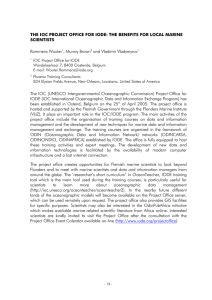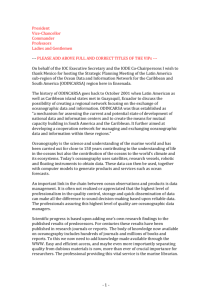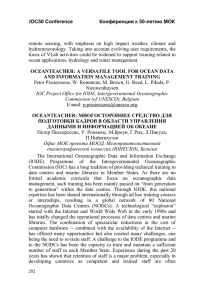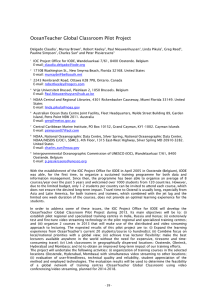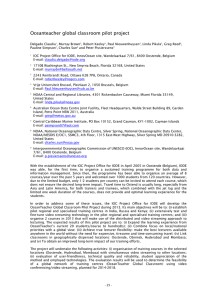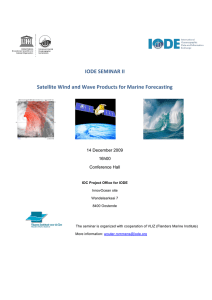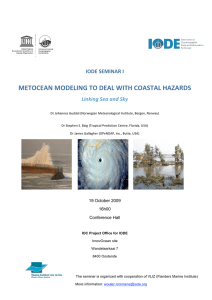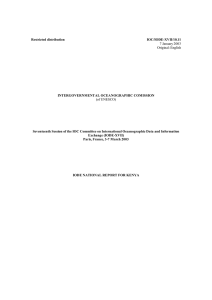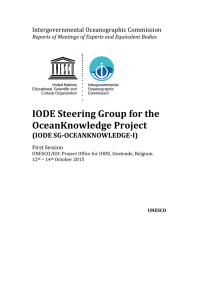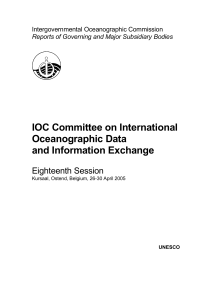Restricted distribution IOC/INF-1145 Paris, 20 July 2000
advertisement
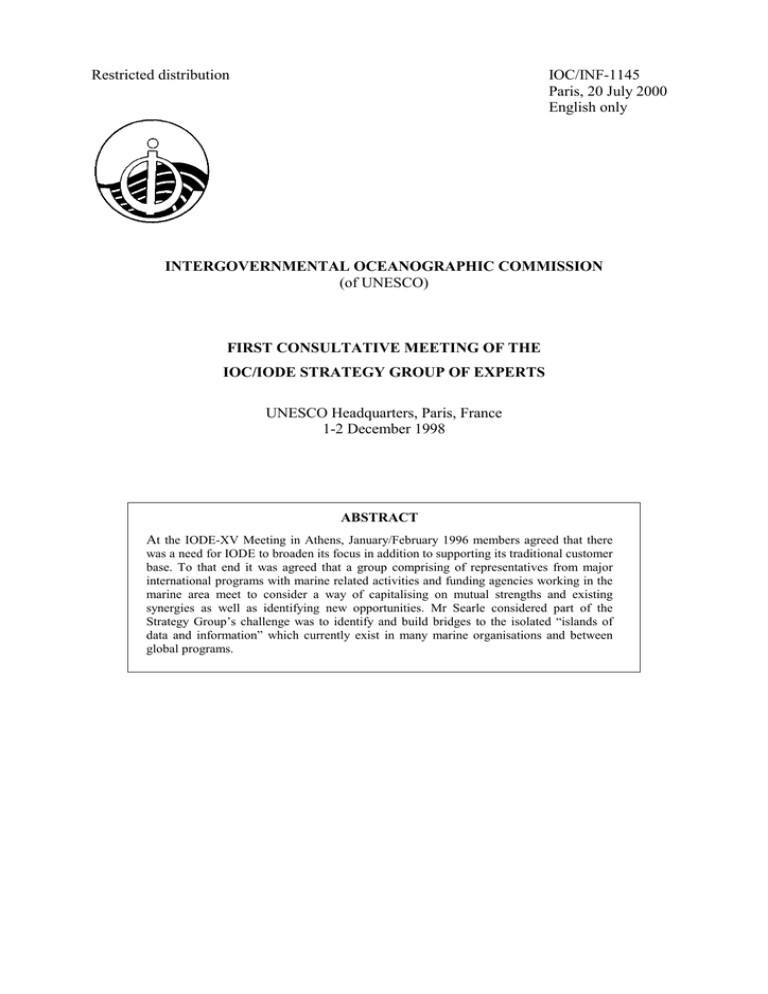
Restricted distribution IOC/INF-1145 Paris, 20 July 2000 English only INTERGOVERNMENTAL OCEANOGRAPHIC COMMISSION (of UNESCO) FIRST CONSULTATIVE MEETING OF THE IOC/IODE STRATEGY GROUP OF EXPERTS UNESCO Headquarters, Paris, France 1-2 December 1998 ABSTRACT At the IODE-XV Meeting in Athens, January/February 1996 members agreed that there was a need for IODE to broaden its focus in addition to supporting its traditional customer base. To that end it was agreed that a group comprising of representatives from major international programs with marine related activities and funding agencies working in the marine area meet to consider a way of capitalising on mutual strengths and existing synergies as well as identifying new opportunities. Mr Searle considered part of the Strategy Group’s challenge was to identify and build bridges to the isolated “islands of data and information” which currently exist in many marine organisations and between global programs. IOC/INF-1145 page 1 1. Opening of Meeting Mr. Searle, Chairman of IODE welcomed participants to the inaugural meeting of the IODE Strategy Group. By way of background Mr Searle explained that at the XV IODE Meeting in Athens, January/February 1996 members agreed that there was a need for IODE to broaden its focus in addition to supporting its traditional customer base. To that end it was agreed that a group comprising of representatives from major international programs with marine related activities and funding agencies working in the marine area meet to consider a way of capitalising on mutual strengths and existing synergies as well as identifying new opportunities. Mr Searle considered part of the Strategy Group’s challenge was to identify and build bridges to the isolated “islands of data and information” which currently exist in many marine organisations and between global programs. 2. Presentations It was suggested that since this was the first meeting of its type the agenda and meeting format would remain reasonably unstructured. In order to provide background and help identify areas of mutual interest, the participants were asked to give a brief presentation on the activities of their respective programs. Presenters 3. Topic Youri Oliounine Structure and Activities of IODE Ben Searle Joint IGOSS/IODE Strategies Ron Wilson IODE Strategy in support of GOOS, GTSPP and other programmes Robert Starek Overview of US Navy Marine Data Collection and Management Eric Lindstrom Overview of WOCE program Martin Bohle-Carbonell EU Framework programmes Ron Witt Overview of UNEP Division of Environmental Information, Assessment and Early Warning activities Colin Summerhaze Overview of GOOS Gerard Szejwach IGBP DIS activities Estathos Balopoulos MAST program activities General Discussions After the presentations there was general discussions on areas of potential cooperation and mutual interest. The significant topics and relevant outcomes are given below. 3.1 Define what it is IODE is managing? Dr Lindstrom referred to the WOCE system, which focuses heavily on providing products using the highest quality data with a strong quality control emphasis. Dr Lindstrom strongly believed that IODE must define what data it would manage and then create high quality products in a format which encourages others to adopt a similar approach. IOC/INF-1145 page 2 3.2 Data Exchange Issues The group discussed at length the importance of data and information exchange and the current limitations in accessibility of data due to technology limitations and lack of uniformity. The Group felt very strongly that a prescriptive approach to data and information standards has not been successful in the past and should not be attempted again. Various approaches to encourage and provide a point of reference for the global marine community were discussed at length. Whilst not wishing to be prescriptive the group recognised that many of the “non-traditional” users were searching for standards that could be adopted and that some form of unified approach should be explored. It was agreed that a prescriptive approach to developing common data formats would not work for a number of reasons. However, it was felt that a common method of describing data and fields within a data set would at least provide some platform for simplifying data exchange and providing a level of commonality. One approach to achieving this was through the development of agreed key words and a thesauris that could be used to provide a common framework for naming data. This would assist the process of creating metadata records of data sets and assist non specialists to locate data more easily. 3.2.1 Recommendation The Strategy Group agreed to work towards developing a minimal standard for data discovery strucutre and tool based on existing and evolving standards for metadata. 3.3 Data Dictionary – A Useful Common Platform Mr Bob Starek indicated that a common metadata dictionary would be especially useful for those collecting and managing data, especially for those that are not exposed to the requirements espoused within the data management community. Mr Bohle-Carbonel disagreed with the notion of the IODE Strategy Group attempting to develop a uniform system but rather suggested alternate strategies to improve data collection and management processes. This included; the establishment of a data award given to the scientist /agency who successfully manages data in an appropriate and effective way such as the use of self describing datasets. ACTION The IODE MEDI Pilot Project system is being suggested as a possible metadata tool for the global observing programs by the Joint Data and Information Management Panel (J-DIMP). As a result of this, the Strategy Group agreed in principle to evaluate existing systems including IODE MEDI Pilot Project data entry tool with the view to create a common tool set (single minimum standard) for metadata entry and exchange. At the highest level this would provide a completely compatible and interoperable system which could be used across programs. This would facilitate metadata exchange between oceanographic data, terrestrial and atmospheric communities. ACTION The Strategy Group will investigate existing lists of keyword and or thesauri of relevance in the ocean realm which would be tabled and discussed at the next meeting. It was hoped that a single list of key words could then be agreed on. IOC/INF-1145 page 3 3.4 IOC Data Management Meeting in Malaysia (October 1999) Mr Searle briefly described an IODE data management conference for the Western Pacific (WESTPAC) to be held in Malaysia in October 1999. This meeting is being supported by the Japan Oceanographic Data Centre and aims to improve the flow on marine data within the region. In order to increase the visibility of IODE in the region it was suggested that people from non traditional data management areas be informed of the meeting and be given an opportunity to attend. ACTION UNEP offered to provide details of appropriate individuals who would benefit from attending the IOC Meeting in Malaysia October 1999. 3.5 Cooperation A major project to improve the ability of African countries to manage marine data and information is being proposed by the Intergovernmental Oceanographic Commission (IOC) with funding being sort from the Government of Flanders. For this project to be successful it is important that the relevant groups in each country are aware of the activities. In addition it is important that there is no duplication with existing activities being undertaken by other intergovernmental agencies. To ensure that the project is undertaken in a coordinated manner the meeting agreed that UNEP, LOICZ, GLOBEC (Roger Harriss),GOOS & IODE should assist in ensuring that appropriate contacts are informed of the activities. The project involves establishing NODC’s, appropriate levels of infrastructure, data rescue and national database development which address the issues arising from the PACICOM agreement. 4. Other Items It was agreed that the Membership of the Strategy group to be broadened to include JGOFS and GLOBEC representatives. The Group considered that Dr. Balopoulos would represent the IODE Strategy Group in relation to EU activities and to identify potential opportunities resulting from the 5th Framework. ACTION USN to work with IODE to examine ways in which data and data processing capabilities could be shared. Bob Starek and Ben Searle to develop this further. 5. Next Meeting Next meeting of the Strategy Group to be held adjacent to another major meeting in 1999. The next meeting of the Strategy group is to review actions and also showcase existing technologies eg: IGBP’s prototype? IOC/INF-1145 page 4 Annex 1 LIST OF PARTICIPANTS Dr E Balopoulos Vice-Chairman IODE Research Director Head, Hellenic National Oceanographic Data Centre Apologies: Ms Maria Hatziolos- World Bank Dr Chris Crossland – LOICZ Mr Dan Van Claasen – UNEP IOC Dr M Bohle-Carbonell Representative, Horizontal Program Issues, European Union Dr W Erb Senior Advisor IOC UNESCO/IOC Dr E Lindstron Oceanography Programme Manager NASA Headquarters Ms M Morrison Executive Officer University of New South Wales Dr I Oliounine Deputy Executive Secretary IOC UNESC/IOC Mr B Searle Chairman IODE Director, Australian Oceanographic Data Centre Mr R Starek Program Manager, US Navy Dr G Szejwach Executive Director IGBP-DIS Dr J Wilson (Past Chairman IODE) University of Delaware Mr R Witt Regional Co-ordinator UNEP UNEP/DEIA/GRID- Geneva Dr Patricio Bernal – Executive Secretary IOC Dr Colin Summerhaze – Director GOOS Project Office Dr I.Oliounine - Head, Ocean Services Unit IOC/INF-1145 page 5 Annex 2 LIST OF DOCUMENTS • • • GTSPP Overview and Future Report List of attendees Joint IGOSS/IODE Data Management Strategy in support of GOOS: The benefits of an end-to-end marine data management capability • The results of the IODE Think Tank meeting- Where are we – Where to go- Paris, France 13-15 March 1995 • EC European Union Research and Science Policy Highlights • EC Selection of Projects Online • NASA - NOPP Data Centre Workshop notes - Data availability GSFC DAAC Accomplishments and Plans
